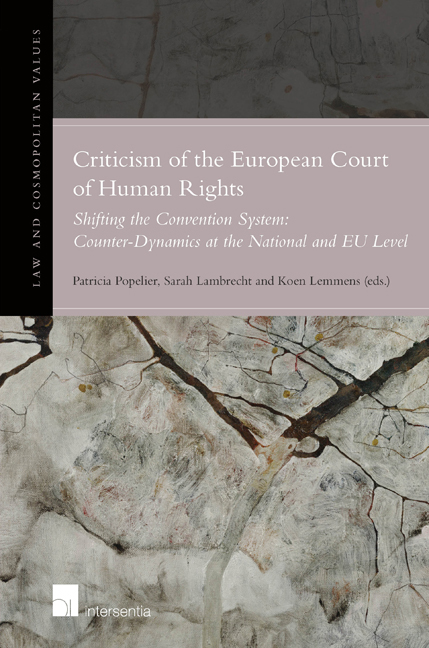 Criticism of the European Court of Human Rights
Criticism of the European Court of Human Rights from PART III - MODERATE CRITICISM
Published online by Cambridge University Press: 13 December 2017
CRITICISM OF THE EUROPEAN COURT OF HUMAN RIGHTS
The subtitle of this report, Je t'aime, moi non plus (I love you, me neither), is a reference to a famous song written by Serge Gainsbourg and sung as a duet with Jane Birkin, as well as to an article published by Professor Simon about the relationships between European courts, the Court of Justice of the European Union and the European Court of Human Rights. In our opinion, the poet's evocation of thwarted love provides an apt summary of the relationships that France maintains with the European Court of Human Rights.
Before beginning this short study, however, we should provide a brief definition of the notion of criticism. As is the case with any notion, criticism can be interpreted in several different ways. It can have a negative connotation, questioning the work of the European Court of Human Rights. On the other hand, it can be interpreted more positively as questioning the work without any attempt to dispute it. These two interpretations do not conflict with each other. Instead, they are complementary. Whereas an interrogation without premise can lead to radical questioning of a jurisdictional work, a negative premise can gradually transform into a comprehensive attitude of the Court's case law. Another point should be stressed as well. Criticism expresses a particular degree of knowledge, intermediating between the speaker (in this case, the European Court of Human Rights) and the party receiving the expression (in this case, the citizens/applicants). From this point, the criticism can interfere in this speech and possibly to disrupt it. It is therefore advisable to measure these effects.
This report thus constitutes a ‘criticism of the criticism’. In this context, the criticism becomes institutional, as it questions the meaning of what is being criticised, in addition to questioning those who are criticising it.
The relationships between France and the Council of Europe, and especially the mechanism of the European Convention on Human Rights and Fundamental Freedoms (hereinafter, the ECHR) and its judges are complex, and even ambiguous.
To save this book to your Kindle, first ensure [email protected] is added to your Approved Personal Document E-mail List under your Personal Document Settings on the Manage Your Content and Devices page of your Amazon account. Then enter the ‘name’ part of your Kindle email address below. Find out more about saving to your Kindle.
Note you can select to save to either the @free.kindle.com or @kindle.com variations. ‘@free.kindle.com’ emails are free but can only be saved to your device when it is connected to wi-fi. ‘@kindle.com’ emails can be delivered even when you are not connected to wi-fi, but note that service fees apply.
Find out more about the Kindle Personal Document Service.
To save content items to your account, please confirm that you agree to abide by our usage policies. If this is the first time you use this feature, you will be asked to authorise Cambridge Core to connect with your account. Find out more about saving content to Dropbox.
To save content items to your account, please confirm that you agree to abide by our usage policies. If this is the first time you use this feature, you will be asked to authorise Cambridge Core to connect with your account. Find out more about saving content to Google Drive.